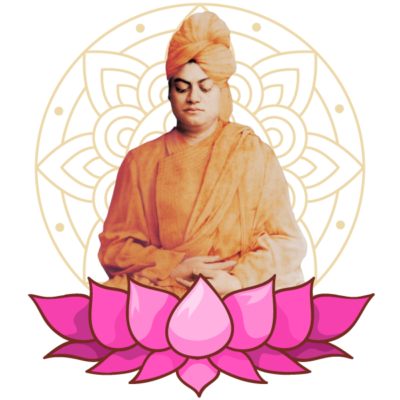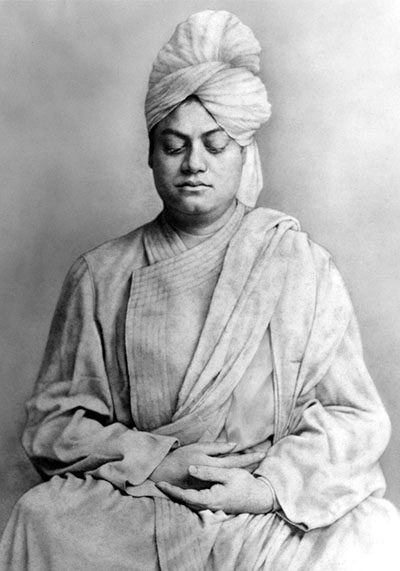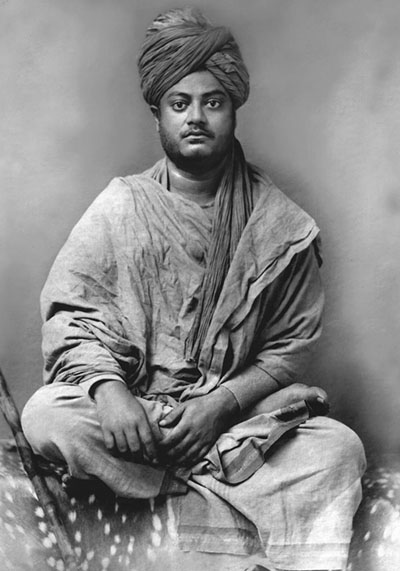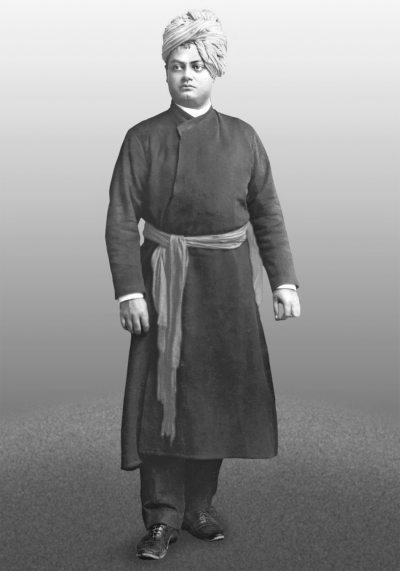Swami Vivekananda
Swami Vivekananda
 Swami Vivekananda (1863 – 1902) is just another name for the phenomenon that exploded on the Indian scene towards the end of the nineteenth century and restored the self-confidence and self-respect of a Nation that had been badly mauled for millennia. Born on the 12th January 1863, of an intellectual but compassionate father and a deeply religious mother, Narendranath that was his original name – got a good education and cultural training under them. An innate desire for spiritual perfection brought him into contact with Sri Ramakrishna in the early part of 1882. The next four and half years — until the Mahasamadhi of Sri Ramakrishna — were marked by turbulence and turmoil, the direct result of the perfect master chiseling and shaping the perfect disciple, bur ending in the total submission of the latter at the feet of the former. As per the specific direction of his guru, Narendra along with the other young men who were his co-disciples took the monastic orders and founded a monastery in his guru’s name at Baranagore (Kolkata) in 1886. Setting out on pilgrimage, mostly as a wandering monk, he finally arrived at Kanyakumari, the southernmost tip of the Indian soil, sometime during 1892. There while meditating on the rock inside the sea, the mission of his life was revealed to him. Then, things moved quickly. Setting sail for America on the 31st May 1893 he created history at the World Parliament of Religions held at Chicago during September of the same year. After whirlwind tours in America and England, he triumphantly returned to India via Colombo on the 15th January 1897. During the next five years, he literally shook the Indian Nation to its foundations, electrifying it to dynamic self-expression, through his speeches and writings as also conversations. These have been compiled and published in eight volumes (now nine volumes), well known as the Complete Works of Swami Vivekananda. They contain, as he himself once remarked, enough messages for millennia. He formally established the Ramakrishna Mission in 1897 and consecrated the newly built Belur Math, the Headquarters of the Ramakrishna Monastery, in 1899. He visited the West again during 1899-1900. He shuffled off the mortal coil on the 4th of July 1902. This was a multifaceted personality – a prophet, a patriot, a monk, a yogi, a social reformer, an educationist, an artist, a poet and a humanist — all rolled into one. His dynamic life and message gave a new direction to resurgent India. His work is being continued even today by the Ramakrishna Math and the Ramakrishna Mission, the twin organizations that he established with the motto: Atmano Mokshartham Jagaddhitaya cha, `For the sake of self-realization and the good of mankind.’ The Math is unique in that it has charted new avenues in Indian monasticism. The mission is an ideal service organization embodying the teachings of practical Vedanta.
Swami Vivekananda (1863 – 1902) is just another name for the phenomenon that exploded on the Indian scene towards the end of the nineteenth century and restored the self-confidence and self-respect of a Nation that had been badly mauled for millennia. Born on the 12th January 1863, of an intellectual but compassionate father and a deeply religious mother, Narendranath that was his original name – got a good education and cultural training under them. An innate desire for spiritual perfection brought him into contact with Sri Ramakrishna in the early part of 1882. The next four and half years — until the Mahasamadhi of Sri Ramakrishna — were marked by turbulence and turmoil, the direct result of the perfect master chiseling and shaping the perfect disciple, bur ending in the total submission of the latter at the feet of the former. As per the specific direction of his guru, Narendra along with the other young men who were his co-disciples took the monastic orders and founded a monastery in his guru’s name at Baranagore (Kolkata) in 1886. Setting out on pilgrimage, mostly as a wandering monk, he finally arrived at Kanyakumari, the southernmost tip of the Indian soil, sometime during 1892. There while meditating on the rock inside the sea, the mission of his life was revealed to him. Then, things moved quickly. Setting sail for America on the 31st May 1893 he created history at the World Parliament of Religions held at Chicago during September of the same year. After whirlwind tours in America and England, he triumphantly returned to India via Colombo on the 15th January 1897. During the next five years, he literally shook the Indian Nation to its foundations, electrifying it to dynamic self-expression, through his speeches and writings as also conversations. These have been compiled and published in eight volumes (now nine volumes), well known as the Complete Works of Swami Vivekananda. They contain, as he himself once remarked, enough messages for millennia. He formally established the Ramakrishna Mission in 1897 and consecrated the newly built Belur Math, the Headquarters of the Ramakrishna Monastery, in 1899. He visited the West again during 1899-1900. He shuffled off the mortal coil on the 4th of July 1902. This was a multifaceted personality – a prophet, a patriot, a monk, a yogi, a social reformer, an educationist, an artist, a poet and a humanist — all rolled into one. His dynamic life and message gave a new direction to resurgent India. His work is being continued even today by the Ramakrishna Math and the Ramakrishna Mission, the twin organizations that he established with the motto: Atmano Mokshartham Jagaddhitaya cha, `For the sake of self-realization and the good of mankind.’ The Math is unique in that it has charted new avenues in Indian monasticism. The mission is an ideal service organization embodying the teachings of practical Vedanta.
Read more on this link …



